You are viewing the Cultures of Knowledge Blog archive for the ‘Projects and Centres’ Category:
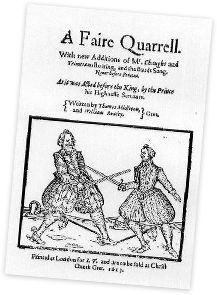 The Electronic Enlightenment Project is currently seeking paper proposals for its second colloquium on the sociology of the letter, Epistolary Quarrels: Matter and Manner (Oxford, 19 November 2011). The colloquium provides a forum for both academics and graduate students exploring correspondence in the early modern period. The papers given by academics will be forty minutes; those given by graduate students will be twenty minutes. Conference papers can be in English or French. A selection of papers will be published electronically in the Electronic Enlightenment Project’s Letterbook. The deadline for 250-word abstracts is Friday 9 September 2011. For further details and how to submit, visit the colloquium webpage.
The Electronic Enlightenment Project is currently seeking paper proposals for its second colloquium on the sociology of the letter, Epistolary Quarrels: Matter and Manner (Oxford, 19 November 2011). The colloquium provides a forum for both academics and graduate students exploring correspondence in the early modern period. The papers given by academics will be forty minutes; those given by graduate students will be twenty minutes. Conference papers can be in English or French. A selection of papers will be published electronically in the Electronic Enlightenment Project’s Letterbook. The deadline for 250-word abstracts is Friday 9 September 2011. For further details and how to submit, visit the colloquium webpage.
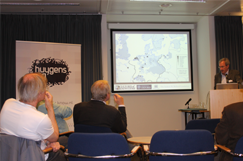
Project Director Howard Hotson opens our talk with some Hartlibian background.
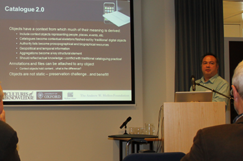
Our technical lead Neil Jefferies describes 'Catalogue 2.0'.
Last week provided us with another opportunity to share the Project, specifically its union catalogue and associated editorial tools, at the international conference Representing the Republic of Letters (The Hague, 30 June–1 July 2011). Organised by our partners and good friends CKCC in the congenial surroundings of the recently renamed Huygens ING, and held in conjunction with the Descartes Centre at Utrecht University, the event showcased the fascinating work being undertaken by various individuals and projects worldwide to represent early modern correspondence networks and their constituent components digitally and visually. General sessions devoted to funding and standards facilitated ongoing collaborative discussions between CofK, our hosts, and Mapping the Republic of Letters (Stanford), who also presented at the event.
James Brown
March 21, 2011
Conferences and Workshops, Events, Project Updates, Projects and Centres
Tags: CKCC, Digitization, Geography, Mapping the Republic of Letters, Networks, Spatial Theory, Union Catalogue, Visualization
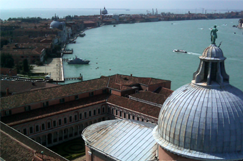
The Fondazione Giorgio Cini on San Giorgio Maggiore, with the island of Guidecca visible in the distance.
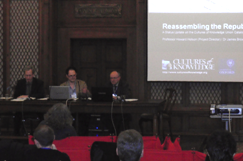
Our panel at the conference, shared with Charles van den Heuvel from CKCC (Huygens Institute).
Last week provided us with an opportunity to present the Project, specifically its union catalogue and associated editorial tools, at the international conference Mapping the Republic of Letters (Venice, 17–18 March 2011). Convened by the Stanford-based project of the same name (based at the Stanford Humanities Center), and held in and co-organised by the Fondazione Giorgio Cini on the island of San Giorgio Maggiore, the event showcased the work being undertaken by various individuals and projects worldwide to collate and represent digitally and spatially the early modern republic of letters. It also explored the research question of whether global exchanges of correspondences and other texts might be best conceived of as a state or as a network. While main sessions provided insights into the very wide range of approaches to this topic, associated meetings introduced the activities of the Milan-based research laboratory Density Design, and facilitated collaborative discussions amongst CofK, our hosts Mapping the Republic of Letters (Stanford), and CKCC (Huygens Institute), who also presented at the event. For further details, please see the conference webpage.
We will be presenting the Project at a wide range of correspondence-related events in 2011. For full details of our speaking schedule, please see the presentations page.
Kim McLean-Fiander
November 12, 2010
Conferences and Workshops, Events, Project Updates, Projects and Centres
Tags: Bodleian Resources, Databases, Digital Miscellanies Index, Digitization, Eighteenth Century, Electronic Enlightenment, Seventeenth Century, Union Catalogue
A report on the roundtable is now available on the CEMS blog
 On Thursday 18 November 2010, the Centre for Early Modern Studies (CEMS) at Oxford will host a roundtable presentation of three early modern digital projects, comprising Cultures of Knowledge (James Brown), Electronic Enlightenment (Robert McNamee), and the Digital Miscellanies Index (Abigail Williams and Jennifer Batt). The event will take place from 12.30-2.00pm at the Oxford e-Research Centre, 7 Keble Road. Tea and coffee will be provided, but please bring your own lunch. For more information, visit the CEMS website.
On Thursday 18 November 2010, the Centre for Early Modern Studies (CEMS) at Oxford will host a roundtable presentation of three early modern digital projects, comprising Cultures of Knowledge (James Brown), Electronic Enlightenment (Robert McNamee), and the Digital Miscellanies Index (Abigail Williams and Jennifer Batt). The event will take place from 12.30-2.00pm at the Oxford e-Research Centre, 7 Keble Road. Tea and coffee will be provided, but please bring your own lunch. For more information, visit the CEMS website.
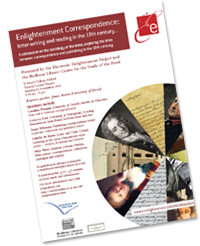 The first Electronic Enlightenment colloquium on the sociology of the letter – Enlightenment Correspondence: Letter-Writing and Reading in the Eighteenth Century – will take place at St Anne’s College on Saturday 13 November 2010. Co-sponsored by the Bodleian Library’s Centre for the Study of the Book, the colloquium will provide a forum for academics and graduate students interested in both correspondence about publishing and the publication of correspondence itself in the Enlightenment period. The event includes papers by keynote speaker James Raven and other scholars from the UK and US on publishing and private correspondence, letters in lives and works, letters as primary sources, and letters as historical documents. For further information, including a list of speakers, paper titles, the programme schedule, and registration information, please visit the colloquium webpage.
The first Electronic Enlightenment colloquium on the sociology of the letter – Enlightenment Correspondence: Letter-Writing and Reading in the Eighteenth Century – will take place at St Anne’s College on Saturday 13 November 2010. Co-sponsored by the Bodleian Library’s Centre for the Study of the Book, the colloquium will provide a forum for academics and graduate students interested in both correspondence about publishing and the publication of correspondence itself in the Enlightenment period. The event includes papers by keynote speaker James Raven and other scholars from the UK and US on publishing and private correspondence, letters in lives and works, letters as primary sources, and letters as historical documents. For further information, including a list of speakers, paper titles, the programme schedule, and registration information, please visit the colloquium webpage.
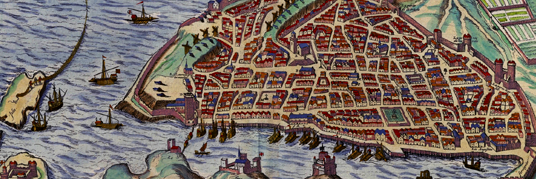
Marseille in 1575. View sourced from Historic Cities.
In the eighth and final installment of the Project’s inaugural seminar series on Wednesday 23 June, held in conjunction with the conference John Selden (1584–1654): Scholarship in Context, Professor Peter Miller (Bard Graduate Center) delivered a wide-ranging overview of ‘Peiresc’s Mediterranean Merchant Network’. Focusing on the letters sent by the polymath from Marseille in the early seventeenth century, Miller elaborated a fascinating story of ‘Peiresc and the sea’ in four parts (which focused respectively on Marseille, space and time in the Mediterranean, merchants, and names). The small, fast nature of Marseillaise ships, especially compared to Venetian craft, meant that letters dispatched from the French port arrived at their destinations quickly (reaching Leiden, for example in fifteen days), and Peiresc’s epistolary activities in the Mediterranean were reliant on an extensive maritime network of non-elite merchants, captains, and sailors, whose identities are in many cases painstakingly recorded (along with other names and biographies) in the letters themselves. This means that it is possible to reconstruct this particular correspondence ‘cloud’ (in Miller’s phrase) in particular detail, and during discussion he provided us with a tantalising glimpse into his forthcoming digitisation initiative which will both visualise Peiresc’s Mediterranean network and link it in an innovative way to an online monograph. For past lectures in the series, please see the seminar webpage; details of the 2011 series will be available shortly.
 The Electronic Enlightenment Project is currently seeking paper proposals for its second colloquium on the sociology of the letter, Epistolary Quarrels: Matter and Manner (Oxford, 19 November 2011). The colloquium provides a forum for both academics and graduate students exploring correspondence in the early modern period. The papers given by academics will be forty minutes; those given by graduate students will be twenty minutes. Conference papers can be in English or French. A selection of papers will be published electronically in the Electronic Enlightenment Project’s Letterbook. The deadline for 250-word abstracts is Friday 9 September 2011. For further details and how to submit, visit the colloquium webpage.
The Electronic Enlightenment Project is currently seeking paper proposals for its second colloquium on the sociology of the letter, Epistolary Quarrels: Matter and Manner (Oxford, 19 November 2011). The colloquium provides a forum for both academics and graduate students exploring correspondence in the early modern period. The papers given by academics will be forty minutes; those given by graduate students will be twenty minutes. Conference papers can be in English or French. A selection of papers will be published electronically in the Electronic Enlightenment Project’s Letterbook. The deadline for 250-word abstracts is Friday 9 September 2011. For further details and how to submit, visit the colloquium webpage.








 Join
Join 